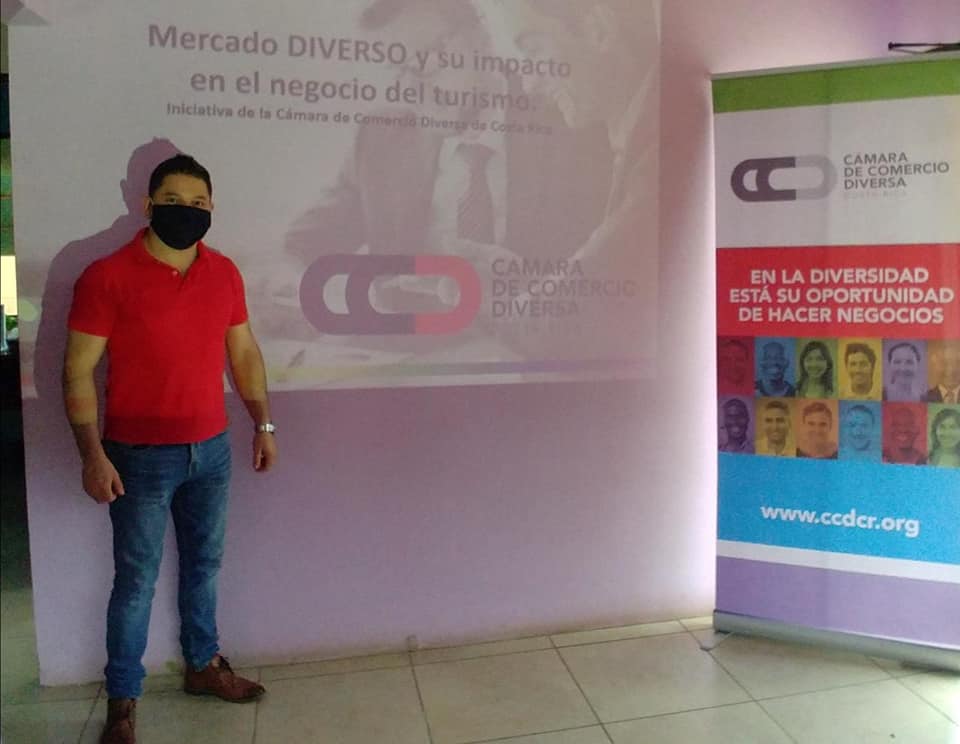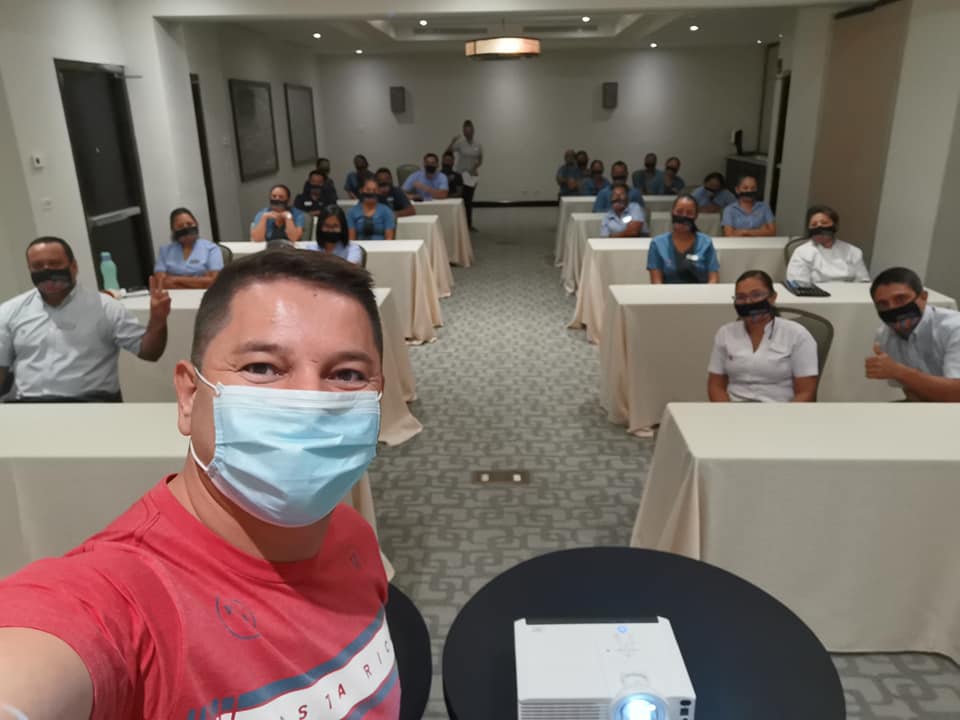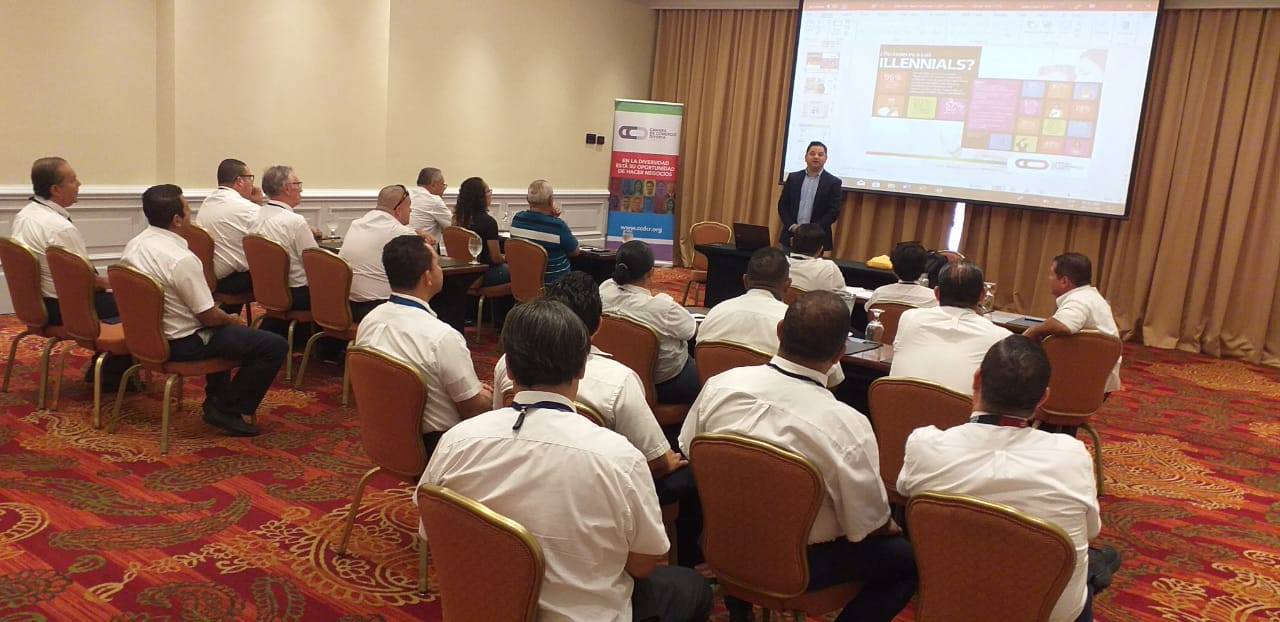“The little girl never grows up.”
The psychologist José Luis García has just posed a question: in the 2001 Russell Crowe movie “A Beautiful Mind,” why does renowned mathematician John Nash realize all in a rush that some of the most important people in his life are actually figments of his imagination? The answer is that in a moment of epiphany, he suddenly remembers that the young daughter of his friend Charles stays the same size, year after year. She never grows or ages. She’s not real, and neither are some of the other characters who’ve been affecting Nash’s life.
This tiny moment of doubt opens the door to a whole new understanding for Nash. But what does this cinematic reference have to do with attitudes towards LGBTIQ+ customers in Costa Rica’s business community? José Luis says that what he’s aiming for when he runs an inclusion workshop for businesses, he’s not aiming for massive transformations in the way people think: just small moments of doubt. Little realizations that might allow for more fluid conversations among coworkers, or bigger changes down the line.
When José Luis, or leaders of the business chamber that organizes these inclusion workshops—the Costa Rican Diverse Business Chamber, or CCDR—interact with business leaders and staff, they’re hoping that everyone involved will have a moment of opening up. A moment to question the assumptions that might affect the way they treat colleagues, customers, or even family members.
‘Feel sorry for us because we’ve been through a lot’
Julio César Calvo is the president of the CCDR, which was created in 2015. He says the creation of the inclusion workshops, in 2017, came about in order to promote the new chamber, but also to address some of the opposition that the chamber faced in its early days.
For a little context: in 2017, when he began to organize his first inclusion workshops for the private sector, Costa Rica was on the brink of an extraordinarily vehement discussion of LGBTIQ+ rights that touched almost every aspect of national life. The topic surged to the forefront when the Inter-American Court of Human Rights handed down a ruling in favor of marriage equality in January 2018. Two presidential candidates with the surname Alvarado, no relation, surged from the back of the pack to the front because of their positions on the ruling, sparking a two-man runoff after the February election: Fabricio, an evangelical who said he would pull Costa Rica out of the Human Rights alliance in order to bypass the ruling, and eventual victor Carlos, the most visibly pro-LGBTIQ+ candidate. All this is to say that Julio César began his effort just when issues of LGBTIQ+ rights were about to blow up in Costa Rica, polarizing a political system typically characterized by amable coexistence.
That was the backdrop for an effort to open up conversation and enlist private-sector allies in a new chamber.
“Starting the Chamber wasn’t easy,” he remembers. “There were many people opposed to the idea, who didn’t believe in the project. That’s why we started the workshops: people had to understand the importance of non-discrimination based on sexual orientation.”

Julio César personally delivered 35 workshops over the course of three years, funded by the yearly payments of chamber affiliates, which start at $100 for a business of up to two members. He worked with multinationals and large businesses such as Avianca and Thermo Fisher; prominent local tourism businesses such as Místico Park in La Fortuna; and small tourism businesses such as Restaurante Freddo Fresas, near Volcán Poás. The two-hour sessions looked at the opportunities that can result from improving customer service for LGBTIQ+ clients and making inclusivity part of a company’s DNA.
María José León Vargas, whose family created Restaurante Freddo Fresas in Poasito de Alajuela, says that the workshop their staff received in 2019 has resulted in a noticeable improvement in the way staff members talk about LGBTIQ+ people they encounter.
“The workshop got into issues that aren’t always clear about different sexual preferences or attractions people feel,” she says. “We reached a pretty complex audience, including women and men who work with members of the public, but in a rural area where these issues aren’t always talked about… the impact for the business was knowing how… to manage the different terms to refer to [LGBTIQ+ people], since that kind of education isn’t widely offered. We only received one workshop, and they [the staff] have improved significantly with regards to that.”
Jorge Fallas, manager of the Hotel Alto Palomo and president of the Rural Experiences Chamber, attended a workshop in 2018. He says the impact of the workshops is especially important in initiating a change in the reception LGBTIQ+ customers might receive.
“A Latin [American], so given to teasing, when he sees a same-sex couple holding hands, or God forbid, kissing each other…” he says, trailing off. “These workshops or inductions provoke a change in the mentality of the person on the level of customer service [towards] empathy and respect.”
He added that the workshops’ emphasis on the economic benefits of inclusion help get entrepreneurs’ attention.
“Customer service has to be high-quality for everyone,” he says. “Because of the kind of society we live in, some people discriminate against the [LGBTIQ+] market. What Julio César has done, very astutely, is to show people that offering quality services of these people… creates market loyalty to the tourism enterprise, because they’re going to recommend it.”
Julio César says that this message was one he began to emphasize as he realized that the workshops could accomplish more than expressing a message of, as he puts it, “You should feel sorry for us because we’ve been through a lot.” The economic impact of the sector is real, especially in this moment of crisis for tourism: “Gay people travel 47% more than heterosexuals,” and spend more, he says.
“We set aside the element of pity,” he says, recognizing that LGBTIQ+ customers are “people who support the economy. All we’re looking for is equality… It’s not changing your religion… no one can say anything about that, or change it. You believe what you believe, and we all respect that. But my sexual orientation deserves to be respected, too.”
More specific, more intersectional

In 2020, with a vision of building on the awareness-raising element of the workshops and adding components designed to meet human resources and customer service needs, Julio César turned to José Luis—whose own business, Prometeo Online, is a CCDR affiliate—to take the Chamber’s outreach to the next level. José Luis observed a workshop, and then began working on a new approach that would implement two major changes.
One was to create slightly different methodologies and content for different types of trainees.
“The Chamber’s goal is that these issues are discussed with everyone, but the discourse isn’t the same with operating staff as with managers,” José Luis explains, adding that customer service staff need hands-on support for better interactions with clients, while managers often need to learn how to manage conflicts that arise about inclusivity. He created modules that could be used at these different levels to meet business’s needs.
The second change, promoted by Julio César, was to broaden the scope of the trainings for an intersectional approach. Now, participants discuss not only how to best serve and include the LGBTIQ+ community in their businesses and customer bases, but also people with disabilities, and people of diverse races and backgrounds.
José Luis says that, whether he’s guiding customer service employees through how to manage their interactions with the public, or guiding managers or CEOs through better ways to address conflict among staffers, he focuses on a central concept: professional respect.
“In our primary group, our family, love prevails,” he says. “In our secondary group, our business, respect must prevail.”
One of the first businesses to receive the new workshop was Thermo Fisher Scientific, whose staff participated in a session with José Luis on May 17th. The company’s senior manager for human resources, Luis Paúlo Solano, says that more than 50 people participated in the event, called “Sexual Diversity: Fashion or Reality.” José Luis led discussions of topics including sex versus sexuality, empathy and tolerance, and belief systems in our society.
The satisfaction rate for attendees was 92%, Luis Paúlo says.
“The staff said they were grateful for this kind of space that the business provides for continuing education, and to keep breaking down myths and prejudices,” he told El Colectivo 506 in an email. “They thought the tips about how to manage these issues with their children, and among coworkers, were very useful.”
Julio César says that the pandemic, while obviously affecting businesses’ ability to engage in trainings, has also heightened many employees’ sense of belonging and responsibility at work and sparked a desire for increased dialogue and a better work environment.
“The companies [who participate] are visionaries in that sense, because as a worker in a business, and now someone who has made it through the pandemic being a worker in a business”, I’m more and more “interested in the company’s real problems,” he says.

Looking ahead
Julio César indicates that one limitation his effort faces to improve companies’ work climates and customer service for diverse customer bases is the country’s political context. Inclusivity training for the private sector will have much less impact, and potentially draw less interest, if its counterpart in the public sector is weakened. He’s referring, of course, to the conscientious objector clause under consideration in the Legislative Assembly. This clause that would allow public servants to object to ongoing inclusivity trainings; Julio César describes the effort to enact it as “absolutely bizarre.”
The Chamber also recognizes that broader change requires institutional support. An April 2021 post on the CCDR Facebook page showcased Julio César’s afternoon spent with tourism chamber leaders, guides, and Tourism Minister Gustavo Segura, asking for the inclusion of LGBTIQ+ issues in both trainings and promotion for the sector.
“We also ask that ICT (Costa Rican Tourism Institute) publicity and marketing include Afro-descendentes, women, men, trans people, people with disabilities, to open up still further the possibility of attracting tourists from different niches,” the post read.
Psychologist José Luis sees institutional support as just as crucial, but on the side of the education system.
“Education is the magic word”, he says. “We do have to pressure politicians, but on the other side of education, I think schools should worry more about training, as well as parents… so this can reach kids and teacher training.”
María José, of Freddo Fresas, says that she thinks the Chamber could achieve greater impact with more workshops, and perhaps more focused ones.
She said she’d like to see “more focused workshops, not just one general session. But even though it’s general, it does work, and it’s detailed. The message gets through. It’s really important that they give more workshops and educate people a little further.
Luis Paúlo, of Thermo Fisher, says he thinks the Diverse Business Chamber needs greater name recognition on a national level.
“I think that the business community and the country don’t know about the existence of the Chamber; the enormous responsibility, vision and commitment it has assumed in our society; and how multinational companies can support it actively,” he says.
Luis Paúlo also says that an important next step is to communicate to more people in Costa Rica that the Diverse Business Chamber is an affiliate of the U.S.-based National LGBT Chamber of Commerce (NGLCC), which offers opportunities including an LGBT-Owned Business Enterprise Certification that can connect LGBT entrepreneurs to greater opportunities.
“Through the LGBTBE Certification, many people can benefit as they offer high quality services,” he says.





